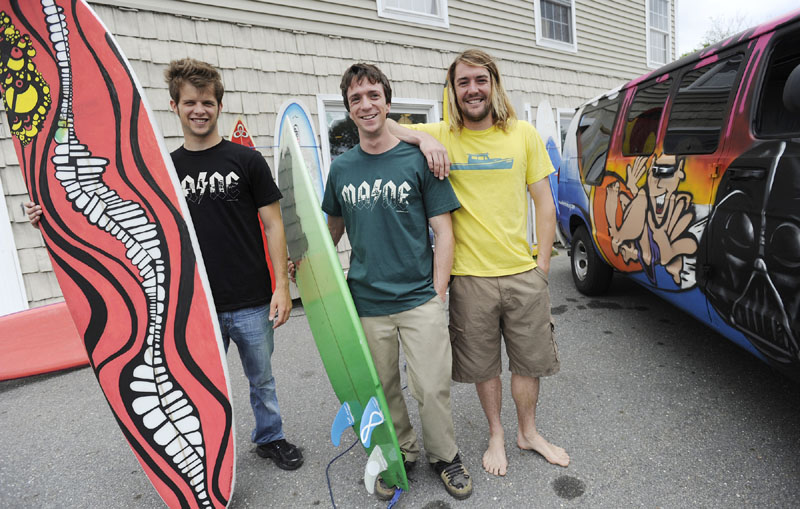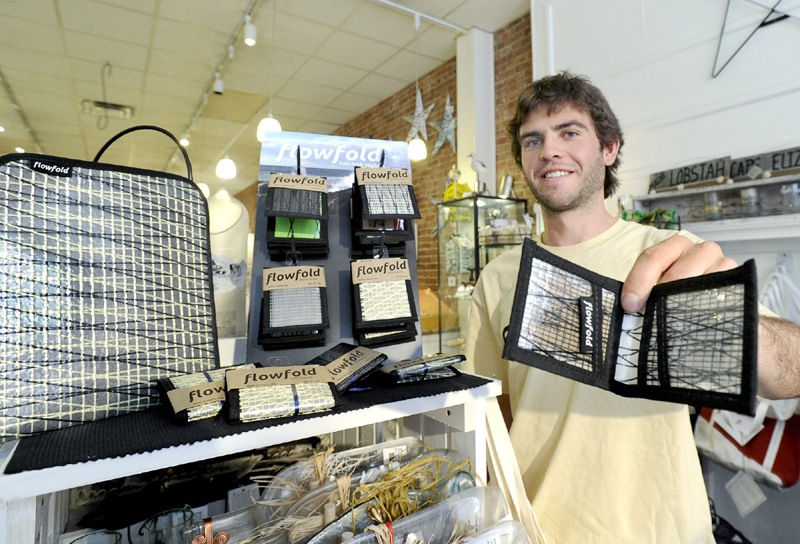The Great Recession and an economy that has remained sluggish have provided a daunting backdrop to would-be entrepreneurs over the past few years.
But even with unemployment among young adults more than double that of the rest of the state’s work force, some ambitious twenty-somethings in Greater Portland have bucked the odds and started their own businesses.
These young entrepreneurs say their projects grew out of longtime dreams, fueled with unending confidence and nurtured with some raw nerve and naivete. One found inspiration amid the scraps of sail cloth on a sewing room floor, another juggles a second job overnight to finance a daytime dream of running a surf shop, while a third had the courage to scrap her business plan and start over after a misstep.
“They are extremely pro-active people. They tend to be the people who make things happen rather than let things happen to them,” said Renee Kelly, director of economic development initiatives at the University of Maine and co-director of the Foster Center for Student Innovation.
These young business creators shrug off the daunting statistics. More than half of all small businesses fail within five years, according to the state Office of Securities.
“Young entrepreneurs are not scared to fail. They don’t want to sit on the sidelines and say I don’t know what to do about life,” said Nate Huckel-Bauer, the new president of PROPEL and lawyer with Drummond & Drummond. PROPEL, a networking organization for young professionals, is affiliated with the Portland Regional Chamber.
The unemployment rate among Maine 16-19 year olds in 2011 was 20.5 percent, up from 14.3 percent in 2003, according to the Maine Department of Labor. For the 20 to 24 age group, the 2011 rate was 16.2 percent, up from 8.3 percent in 2003. The numbers reflect only those people actively looking for work — they don’t include people enrolled in college or vocational training.
“That age group doesn’t always trail other age brackets, but it always does during a recession,” said Charles Colgan, professor of public policy and management at the Muskie School of Public Service at the University of Southern Maine. “During a recession, youth unemployment gets very high, very quickly as companies lay off people and they’re not hiring new workers. And when companies start hiring again, they go for more experienced workers.”
Overall, unemployment in Maine was 7.4 percent in May, up from 7.2 percent in April, according to the Department of Labor. “Unemployment for youth goes very high, very quickly and it takes a long time to go down,” Colgan said.
Colgan does not expect unemployment for young adults in Maine to fall below 10 percent until there has been at least three years of overall economic growth. He does not expect economic growth to really gain momentum in Maine until 2013 at the earliest.
Nationally, just over half of recent college graduates are working full time, according to the John J. Heldrick Center for Workforce Development at Rutgers University. Twelve percent were either unemployed or employed part-time and looking for full-time work. Many others are not actively looking for work so they don’t appear in the statistics.
Black Point Surf Shop, Scarborough
“There’s not a fraction of a thought that it would not work,” said Ryan McDermott, 25, a partner in Scarborough’s new Black Point Surf Shop, boasting the confidence of this young breed of entrepreneurs.
Earlier this year, Ryan and his brother Andy McDermott, 28, made friends with with a fellow surfer on Scarborough beach who was also a marketing student from the University of Southern Maine who needed to create a business plan for a school project.
The McDermotts, who make their own surfboards and also run a landscaping business, had been approached in the past by others with a passing whim to own a surf shop, but nothing panned out.
Something set Brett Dobrovolny, 23, apart.
“He had a spark in his eye when he talked about. There was something different about him,” said Ryan McDermott.
Dobrovolny said he’d been saving for his own business since he was 16 years old and inherited money from his grandfather last year. He declined to disclose how much it took to open Black Point.
“I could have looked for a ‘big-boy pants’ job with my degree, but I thought it would be more meaningful to use the money this way,” Dobrovolny said.
He’s been helping get Black Point off the ground while juggling a 9 p.m. to 9 a.m. job caring for people with mental disabilities. Working around the clock doesn’t faze him.
“People have to be prepared for the sacrifice. A lot of time and money has been burned on this. But some of the best businesses in the world were built on sacrifice,” Dobrovolny said. “It’s like jumping on a wave. You clench your teeth and go.”
So far, the surf shop has grossed $17,000 in sales since it opened two-and-a-half months ago and it’s breaking even on expenses, Dobrovolny said.
Black Point said it’s the only full service surf shop in the state, where customers can watch the McDermotts making and repairing boards, as well as buy new boards and surf apparel. Local artists have painted some of the boards with unique designs.
In advising other young people looking to build their own businesses, Dobrovolny said “You need aspirations. You need to chase those, but enjoy what you have while you’re building something. Once you get into a bad vibe, you’ll never get out of it.”
iBec Creative, Portland
“I was trying to make a job for myself. I didn’t necessarily think I’d be building a company,” said iBec Creative president and founder Becky McKinnell, who founded the company in 2006, when she was 22 years old.
iBec now has 14 employees and is on track to reach $1 million in revenue this year, McKinnell said.
As a student at University of Southern Maine’s art and entrepreneurial studies program, she wrote a business plan for a Web design firm for medical professionals named MediCreative. A year into the project, she realized it wasn’t taking off, so she shifted the focus away from health care to general Web design and rebranded the company as iBec. The Portland firm specializes in Web design, branding and Internet marketing.
“If I had stayed as MediCreative, I wouldn’t be in business today. I had to be willing to change,” McKinnell said.
iBec has customers that range from Gorham Savings Bank to the Meadowmere Resort to East End Cupcakes.
“Starting a new business is daunting for everyone. But when you’re younger you really have to prove yourself,” McKinnell said. “I used to dress extra professional or older to try appear more serious. But now I realize that people look to our generation for advice on technology usage. It took a while to get comfortable in my own skin.”
McKinnell strongly urges young adults looking for jobs or wanting to start their own business to get some real world experience through an internship.
“Just the experience of working in the real world, even for a short time, and learning the pace and the level of customer service demanded, is invaluable,” McKinnell said. “You also have to have an undying sense of passion and determination.”
FlowFold, Peaks Island
As a teenager Charles Friedman, 23, worked sewing sailboat sails in Yarmouth. When his grandfather’s old leather wallet fell apart, he crafted a new one from scrap sailcloth. After hundreds of prototypes and a $10,000 loan from the Island Institute in Rockland, Friedman founded FlowFold in 2010, when he was 21.
“I was scheming up a business for a long time. Instead of taking notes in class, I was building a brand,” said Friedman, who said he’s been working ever since middle school busing tables on Peak’s Island or painting houses.
He credits the University of Maine’s Foster Center for Student Innovation with helping him learn about business basics such as paying sales tax, writing a business plan and trademark registration.
“As a young person with no business history, you can’t just walk into a bank and get a line of credit,” Friedman said.
FlowFold, whose slogan is Carry the Future, uses scrap material from high-tech racing sailcloth to make wallets and iPad cases.
“We’re not the first people to make products out of recycled sailboat cloth. It’s the value and quality and design we put into it,” Friedman said.
Revenues are expected to be in the range of $75,000 to $100,000 this year, up from $35,000 in 2011, Friedman said. The company produced 5,400 units in 2011, and has made 3,492 units so far this year.
Friedman has a partner and co-owner, Devin McNeill, as well as a salesman. Another person handles shipping about 30 hours a week, and four to five independent contractors handle sewing.
“We’ve learned that the rules of business apply to everyone no matter how old you are,” Friedman said. “Act as seasoned as everyone else,” Friedman said. “It’s easy to dream really big at first, but focus on what you do best.”
Flannel, Portland
Not every young entrepreneur is in business for the money.
Three young Mainers have a project of passion that they call Flannel, a magazine dedicated to “what we love about the state: the great outdoors, the creativity and the do-it-yourself mentality,” according to their website.
Sean Collinson and Travis Bourassa started Flannel in 2008 when they were 24 and 25, respectively, as a hand-assembled ’zine featuring art from their friends.
Now, they are launching their sixth issue with a limited run of 250 copies that features artists across the state. They distribute in galleries, music shows and stores across the state with the help of their friend Jessica Harvey.
Flannel aims to showcase an edgier side of Maine’s art scene. No lighthouses, seagulls or lobsters.
“The three of us feel that kind of landscape is done for the tourists and features what will appease people,” said Bourassa.
The project got some help from the University of Maine’s Foster Center for Student Innovation, but business advice was never what the friends sought.
“That wasn’t really our goal,” said Bourassa. “Our goal is getting people’s work out, not to make a buck.”
Bourassa and Collinson said they work at Traders Joe’s to earn a living and produce Flannel twice a year to help promote Maine art.
Their advice for young people out of work? “Spend your time with something you love and something good will come of it,” Bourassa said.
Send questions/comments to the editors.




Comments are no longer available on this story